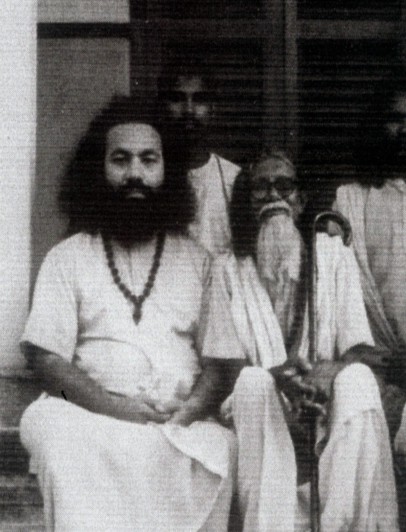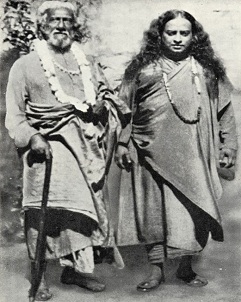

|
|
|||
|
|
|||
|
|
|||
|
|

|
|
||
|
|
||
|
|
||
|
|



|
|
|||
|
|
|||
|
|
|||
|
|

|
|
||
|
|
||
|
|
||
|
|

When one begins the practice in the spiritual field, the teaching and guidance of a master is essential. The master’s role is to teach, guide, give advice and correct the practice of the student. The master does not expect veneration or worship from his pupil, nor does he expect his student to praise or speak highly of him. He does not want to keep the student at a low level; on the contrary, his aim is to bring the student up to his own level and to make a master of him.
When a student has acquired all the knowledge that his master can give him, then he should progress further and obtain direct experience in the spiritual field so that he becomes a master himself. Sometimes the disciple can go further than his master. The master’s life is crowned with success when he can sow the spiritual seed and help it grow.
If a teacher stops his student from seeing other masters, telling them that they should limit themselves to only one teaching, then the teacher is not playing his role correctly. The scriptures say:
Madhu-lubdva yatha bhramara puspapuspantaram vrajet,
Gyana-lubdha tatha sisya gurugurvantaram vrajet.
“The student should be left totally free to explore the spiritual field just like a bee that gathers spiritual nectar from different flowers.”
The scriptures teach us that a disciple can go from one master to another in his spiritual search and in this way experiment with different methods that he can practice. The disciple should not feel limited, nor fear learning other techniques, thereby gathering the nectar of spiritual knowledge from different realized masters.
The student must, of course, develop a balance between skipping from one technique to another and developing depth in one’s practice. The right technique and depth are both essential for spiritual progress.


Swami Shankarananda and Swami Narayana Giri |
Swami Shankarananda and Swami Hariharananda Giri |
Paramhansa Yogananda and Sri Yukteswarjee |
The duty of a master is to teach the specific knowledge that he holds. This knowledge can neither be bought nor sold. The duty of a student is to learn from his master in a progressive way, with constancy and with divinity. Sri Yukteswarjee used to say that a real master should produce masters, not disciples.
If a master knows much about external rules and regulations, but not their real meanings and effects, then this can be detrimental. In such cases rules and regulations may not always be applied wisely. This is why the words “guru” and “mastery” are often misunderstood. At university, one can obtain a master’s degree in various academic subjects ranging from the arts and sciences to more practical subjects such as agriculture or engineering-but the scriptures do not consider these as mastery. The scriptures say that a master is one who has self-mastery. Self-mastery, sense mastery and breath mastery is proper mastery. Without self-mastery, it is impossible for a person to teach. The master has to be a living example for his students. A true master will not change for egoistic purposes any ancient techniques or methods of teaching, which have been handed down by the lineage and have been practiced continuously for millennia by both, masters and the disciples.
To believe that true understanding can be acquired in a weekend or in a month, if you pay an exorbitant price, or to think that since there is little time, money can compensate, is a mistake. Self-realization can neither be bought nor sold. Any money exchange in the process of learning and practicing a true spiritual technique only has a symbolic meaning.
Regular and sincere practice according to a master’s teachings, without transforming, changing or coloring the teaching in his own way for satisfaction of his ego yields good results for the student. A spiritual transformation is a slow metamorphosis. Believing that there is no time, that one is too old or that money can buy realization is false; such beliefs waste time and energy. There is no correlation between the money spent and the speed of results, the spiritual value or the efficacy of the technique. The relationship between the master and the student is a divine relationship; it lies at a very subtle level and it has nothing to do with money. The master is being “paid” for his teachings by the satisfaction he gets when his student succeeds in the spiritual field. This is a divine compensation.
The role of the master is so important that it is difficult to express its extent. He takes care of his disciple and, whenever the need arises, gives them spiritual advice or suggestions in order to resolve their emotional, psychological or mental problems. Sometimes a student comes to the master in a deplorable state and then the master must give him the awaited, expected consolation. The duties of a master are never ending.
A master cannot choose his disciples-he must welcome and accept each and every one, good or bad, but the student can choose the master who is most suitable for him. However, the choice is not always easy. Suppose you want to buy a musical instrument. Before buying it, you have to try it out to judge its quality. Now, if the buyer has no experience and is only a beginner, how can he choose wisely or knowledgeably? He would have to ask someone else to help him make a decision. This is why a master must be pure and perfect in his teachings as well as his writings so as not to pollute the innocent mind of the student.
Sri Yukteswarjee would often say that it is better to remain silent rather than to pollute the minds of people, because they are usually willing to follow and apply the teachings of spiritual masters. It is much better to remain sitting silently than to say words which could be misunderstood.
It is difficult to recognize a true master. However, the Bhagavad Gita (XIII, 8) assists us by listing the following ten qualities, which should be present in a spiritual master:
amanitwa |
a person who has no individual self, who does not distinguish between his self and the self of others |
adambhitwa |
a person who is neither egotistic nor rigid |
ahimsa |
a person with non-violent thoughts, who is not offensive, but who is open to everyone |
ksantih |
acceptance of others and capacity to forgive |
arjava |
sweetness, especially in speech; behaving in a civilized and polite manner; modesty |
achara |
good behavior |
upasana |
one who sits close to the Soul, who always remains in the Soul or in a state of meditation |
sthairya |
one who has perfect control over the senses |
atmana |
he who is established in the Soul |
vinigraha |
one who is beyond good and evil |
A master should remain above any problems and see things only as a witness (saksibhuta). The disciple should be able to open himself up to the master in total confidence, knowing that he will be listened to and advised in the best of ways. The disciple should not talk about his experiences to anyone but his master. Only then will the master be able to give practical advice thus allowing a close relationship to be established.
Some people pretend to be masters and they falsely represent themselves as God. It is said in the scriptures:
Saile saile na manikyam, mauktikam na gaje;
Sadhuba na hi sarvatra, chandanam na vane vane.
“Gems are not found in every mountain nor are pearls present in every elephant; saints are not everywhere, nor are sandalwood trees in every forest.”